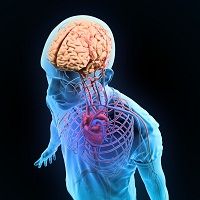Article
Alzheimer's Disease and Cardiovascular Health
Author(s):
Cardiac disease could be a predictive factor for Alzheimer's disease and dementia, according to research published in Circulation.

A contributing factor to Alzheimer’s disease could be poor heart function, according to findings published in Circulation.
Researchers from the Vanderbilt University Medical Center screened nearly 1,100 patients in order to compare cardiac index — the measure of heart health, which examined cardiac output or the amount of blood that exists the heart and is pumped through the body – to the development of dementia. The participants (53% women, average age about 69 years) were free of clinical stroke, transient ischemic attack, or dementia at the sample time. The participants were followed up with for an average time period of 7.7 years.
Various data about the participants was collected, such as age, sex, systolic blood pressure, anti hypertensive medication, diabetes status, cigarette smoking, cardiovascular disease history, atrial fibrillation, and education. Additionally, the researchers compared apolipoprotein E4 status related cardiac MRI assessed cardiac index to incident all cause dementia and Alzheimer’s disease diagnosis.
“Heart function could prove to be a major risk factor for dementia and Alzheimer’s disease,” principal investigator Angela Jefferson, PhD, explained in a press release. “A very encouraging aspect of our findings is that heart health is a modifiable risk. You may not be able to change your genetics or family history, but you can engage in a heart healthy lifestyle through diet and exercise at any point in your lifetime.”
The researchers determined there were 32 patients who developed dementia, which included 26 cases of Alzheimer’s disease. The patients with clinically low cardiac index had a higher relative risk of dementia compared to the normal cardiac index. Similarly, if the 184 patients with clinically prevalent cardiovascular disease and atrial fibrillation were excluded and that the researchers identified were excluded from the analysis, clinically low cardiac index had a higher relative risk of both dementia and Alzheimer’s disease compared to the normal cardiac index patients.
“The risk we found between lower cardiac index and the development of dementia may reflect a subtle but protracted process that occurs over decades — essentially a lifetime burden of subtle reductions in oxygen and nutrient delivery to the brain,” concluded Jefferson, who is also the director of the Vanderbilt Memory & Alzheimer’s Center. “That possibility is concerning given the observation that one in three participants in our study met the medical definition for low cardiac index. At present, there is no proven method for preventing dementia or Alzheimer’s disease. But leading a heart healthy lifestyle could help. When 30 percent of the population is exposed to a potential risk factor, like low cardiac index, that suggests it may be of significant public health concern.”





